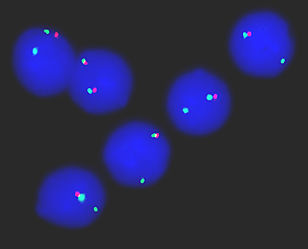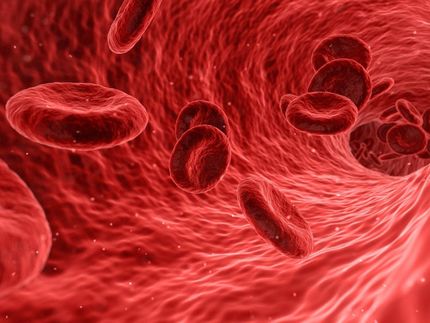How Cancer Cells Escape Death
Coordinated by the German cancer Research Center (Deutsches Krebsforschungszentrum, DKFZ) and the University of Ulm, scientists are collaborating in a new Helmholtz Virtual Institute to study how leukemia cells become resistant to programmed cell death and to chemotherapy. Their aim is to find out how this resistance can be overcome in order to facilitate better cancer treatment.

A single red signal in the nucleus of leukemia cells indicates a partial loss of chromosome 17 leading to resistance to apoptosis and chemotherapy.
Daniel Mertens, German Cancer Research Center and University Ulm
Programmed cell death, or apoptosis, is a protective mechanism of the body to prevent cells with damaged genetic material from becoming dangerous for the whole organism. In cancer cells, however, this protective mechanism often fails and they become resistant to those signals that order them to commit suicide. This is particularly fatal, because the effective mechanism of many types of chemotherapy is to trigger apoptosis.
Cancer researchers are therefore trying to find out how resistance to apoptosis evolves in cancer and how it may be overcome. “For successful treatment of cancer it is crucial to understand resistance to apoptosis and chemotherapy,” says Professor Dr. Peter Lichter of DKFZ, who is one of two coordinators of the Virtual Institute.
The collaborating scientists have chosen chronic lymphocytic leukemia (CLL), the most common leukemia in adults, as a model system. “Our collaboration partners have a great deal of experience with this cancer. And we also expect that mechanisms identified in CLL will apply to other types of cancer, too,” says Dr. Daniel Mertens of Ulm University, the other coordinator of the research collaboration.
Researchers collaborating in the new Virtual Institute are investigating, on the one hand, the signals which cancer cells exchange with their surrounding tissues. On the other hand, the investigators are searching the whole genome of leukemia cells to identify sequence alterations of genes and chemical modifications of individual genetic building blocks which change gene activity. By these approaches they hope to identify new target molecules that are characteristic of resistance to apoptosis and can be used as targets for enhanced anticancer drugs. In a parallel effort, the collaborators will search through large substance libraries to find substances which are able to specifically block newly discovered target molecules.
Alongside DKFZ scientists, members of the Virtual Institute are scientists of the National Center for Tumor Diseases (NCT) Heidelberg, of the Universities of Duisburg, Essen, Ulm and Wurzburg as well as from the U.K. and Denmark.
Other news from the department science

Get the life science industry in your inbox
By submitting this form you agree that LUMITOS AG will send you the newsletter(s) selected above by email. Your data will not be passed on to third parties. Your data will be stored and processed in accordance with our data protection regulations. LUMITOS may contact you by email for the purpose of advertising or market and opinion surveys. You can revoke your consent at any time without giving reasons to LUMITOS AG, Ernst-Augustin-Str. 2, 12489 Berlin, Germany or by e-mail at revoke@lumitos.com with effect for the future. In addition, each email contains a link to unsubscribe from the corresponding newsletter.





















































